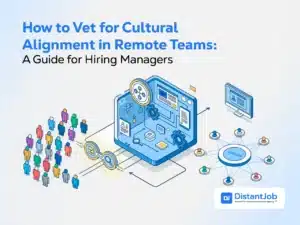Remote workers are more productive. Study after study has shown that this is true, and yet the stereotype of the lazy home worker, putting in just enough effort to avoid being fired persists. The counter to that argument is a different kind of stereotype, it’s the shut-in remote worker with no boundaries who put in extra hours in the morning, evening, and at weekends until they crash and burn.
While you’re unlikely to come across anyone at the very extreme ends of the remote spectrum like this, these stereotypes exist for a reason: there are remote workers who behave like this. Whether that’s a team member who slacks off or one who doesn’t know when to stop there are some serious negatives for your team.
So, how do you recognize this sort of behavior in your staff, and what can you do to prevent it? As a bespoke remote recruitment agency, we’ve seen all the stereotypes in our time. Here’s what we’ve learned.
The Slacker

Before we start, let’s get one idea out of the way. It’s not best to measure remote workers by the hours they’re active at the keyboard. Let’s be honest, that doesn’t work well with office workers either. Presenteeism doesn’t help anyone. One of the big benefits to productivity for remote workers is their ability to schedule their day so they work when it best suits them. Early birds might get their work done to the dawn chorus, night owls might thrive listening to…well, night owls.
We advocate measuring your remote workers on results, not keystrokes logged. If you ask them to do things, and they do them correctly and on time, then it doesn’t matter when they do it, or even how long it takes. For creative work like development, a lot of the ‘work’ can be best done by getting away from the keyboard and letting the subconscious take a crack at the problem. If you’re happy with the output your remote dev is giving you, they’re not a slacker.
But if the output isn’t what you want, or the results seem rushed or lack attention to detail then you might have a problem. If phone calls go unanswered during agreed hours, and there’s no contribution on the slack channel or updates to your task management system, you definitely have one.
What you can do
Hopefully, before you got to the stage of hiring a remote worker, you put together a contract that covers your expectations. If you did, and your digital nomad is wandering too far, it’s time to have a conversation.
While it might be tempting to think about these slackers as having their feet up by the pool or have been binge-watching Umbrella Academy, it may not be a case of poor self-control. Your remote worker may be getting stalled waiting on other team members or struggling to solve problems when they’re the only one awake.
If you have a first-time remote worker, they may be finding it hard to adjust to being accountable for their own time. If they are, then giving them a little extra help like breaking projects down into smaller chunks and setting daily deadlines might help.
If it turns out that you have a distractible developer, who can’t help but hit ALT-TAB and read the latest edition of XKCD , then a tool like Cold Turkey might help. It’s an app that allows your staffer to block off their working hours, and during that time they can also block certain websites.
We don’t advocate using time tracking apps with your remote team. As we’ve said, it’s better to measure results rather than time at the keyboard. But if you have a problem staffer, it can be worth helping them to train themselves to stay on target using something like Timely or one of our other non-Orwellian suggestions. Your aim needs to be to keep a low admin burden, though, or you’re just replacing one distraction with another.
And if you didn’t make your expectations clear on hiring, now is the time to do so. Create a document that covers hours of working including overlap with your time if you are crossing time zones. Don’t forget to include expectations for contact, deliverables, and how they can reach out if they find themselves stuck out of office hours.
The Burn-Out

The flipside of the slacker coin is the burnout. We’re talking Sandra Bullock in The Net, a shut-in who spends so much of her time hacking away at code that no one knows who they are. It’s becoming more widely acknowledged that some of the performance boost that remote workers bring is caused by putting in more hours – up to 7 per week.
It’s not just working when they’re feeling under the weather, when their office-based colleagues call in because they can’t face the commute. It’s starting their working day when their colleagues are leaving the house and continuing when they’ve gone home. It’s checking email and responding to help desk tickets in the evening or at weekends.
While this can pay dividends in terms of lines of code written, the problem comes when that amount of work just isn’t sustainable. Working long hours isn’t great for our health or our happiness. If your coder is neglecting friends or family, that’s not going to end well for anyone. For the sake of your team members mental and physical health, you need to step in.
What you can do
Just like the slacker, your first step is to have a conversation with your super-coder. It’s possible that they are putting in as many hours as they can because they are having some personal issues they want to forget, and if so, you need to stress that they’re no use to you if they burn out.
Consider whether their workload is manageable, too. The trouble with great staff is they word gets out and soon everyone wants that one dev to help them with their problem. Are they having to put in too many hours just to keep up with what they’re being asked? Can you, as their manager, do anything to protect them from being asked to do too much?
Or they may be picking up the slack from colleagues, answering questions to literally taking over jobs to make sure the deadlines don’t slip. It’s well worth talking to work out why they are having to put in so many hours and doing whatever you can to make their workload more manageable, for example making sure all problems go through the help desk rather than directly to your dev team.
If all else fails, then an enforced vacation is in order. Ask your staffer to pick some dates and make sure all their tasks get handed over before they go. Let your team know that they are not to contact that colleague while they’re away; protect their time off until they learn to do it for themselves.
The Ideal Remote Employee
The idea of remote work is really gaining acceptance, and that means that more jobs are available over distance than ever before. The logical consequence of that is that new remote workers are joining the movement all the time. They’re not all going to be naturals at working from home, and some of them will be unsuited to it.
If you want to make sure that the person you hire has what it takes, then get in touch today. We pre-screen all our talent for technical ability and their remote working history. Your best chance of hiring the ideal remote developer is to let us help!




